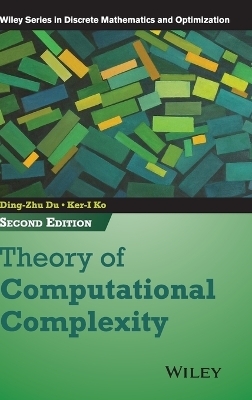
Theory of Computational Complexity
John Wiley & Sons Inc (Verlag)
978-1-118-30608-6 (ISBN)
Praise for the First Edition
"... complete, up-to-date coverage of computational complexity theory...the book promises to become the standard reference on computational complexity."
—Zentralblatt MATH
A thorough revision based on advances in the field of computational complexity and readers’ feedback, the Second Edition of Theory of Computational Complexity presents updates to the principles and applications essential to understanding modern computational complexity theory. The new edition continues to serve as a comprehensive resource on the use of software and computational approaches for solving algorithmic problems and the related difficulties that can be encountered.
Maintaining extensive and detailed coverage, Theory of Computational Complexity, Second Edition, examines the theory and methods behind complexity theory, such as computational models, decision tree complexity, circuit complexity, and probabilistic complexity. The Second Edition also features recent developments on areas such as NP-completeness theory, as well as:
A new combinatorial proof of the PCP theorem based on the notion of expander graphs, a research area in the field of computer science
Additional exercises at varying levels of difficulty to further test comprehension of the presented material
End-of-chapter literature reviews that summarize each topic and offer additional sources for further study
Theory of Computational Complexity, Second Edition, is an excellent textbook for courses on computational theory and complexity at the graduate level. The book is also a useful reference for practitioners in the fields of computer science, engineering, and mathematics who utilize state-of-the-art software and computational methods to conduct research.
DING-ZHU DU, PhD, is Professor in the Department of Computer Science at the University of Texas at Dallas. He has published over 180 journal articles in his areas of research interest, which include design and analysis of approximation algorithms for combinatorial optimization problems and communication networks. Dr. Du is also the coauthor of Problem Solving in Automata, Languages, and Complexity, also published by Wiley. KER-I KO, PhD, is Professor in the Department of Computer Science at National Chiao Tung University, Taiwan. He has published extensively in his areas of research interest, which include computational complexity theory and its applications to numerical computation. Dr. Ko is also the coauthor of Problem Solving in Automata, Languages, and Complexity, also published by Wiley.
Preface ix
Notes on the Second Edition xv
Part I Uniform Complexity 1
1 Models of Computation and Complexity Classes 3
1.1 Strings, Coding, and Boolean Functions 3
1.2 Deterministic Turing Machines 7
1.3 Nondeterministic Turing Machines 14
1.4 Complexity Classes 18
1.5 Universal Turing Machine 25
1.6 Diagonalization 29
1.7 Simulation 33
Exercises 38
Historical Notes 43
2 NP-Completeness 45
2.1 Np 45
2.2 Cook’s Theorem 49
2.3 More NP-Complete Problems 54
2.4 Polynomial-Time Turing Reducibility 61
2.5 NP-Complete Optimization Problems 68
Exercises 76
Historical Notes 79
3 The Polynomial-Time Hierarchy and Polynomial Space 81
3.1 Nondeterministic Oracle Turing Machines 81
3.2 Polynomial-Time Hierarchy 83
3.3 Complete Problems in PH 88
3.4 Alternating Turing Machines 95
3.5 PSPACE-Complete Problems 100
3.6 EXP-Complete Problems 108
Exercises 114
Historical Notes 117
4 Structure of NP 119
4.1 Incomplete Problems in NP 119
4.2 One-Way Functions and Cryptography 122
4.3 Relativization 129
4.4 Unrelativizable Proof Techniques 131
4.5 Independence Results 131
4.6 Positive Relativization 132
4.7 Random Oracles 135
4.8 Structure of Relativized NP 140
Exercises 144
Historical Notes 147
Part II Nonuniform Complexity 149
5 Decision Trees 151
5.1 Graphs and Decision Trees 151
5.2 Examples 157
5.3 Algebraic Criterion 161
5.4 Monotone Graph Properties 166
5.5 Topological Criterion 168
5.6 Applications of the Fixed Point Theorems 175
5.7 Applications of Permutation Groups 179
5.8 Randomized Decision Trees 182
5.9 Branching Programs 187
Exercises 194
Historical Notes 198
6 Circuit Complexity 200
6.1 Boolean Circuits 200
6.2 Polynomial-Size Circuits 204
6.3 Monotone Circuits 210
6.4 Circuits with Modulo Gates 219
6.5 Nc 222
6.6 Parity Function 228
6.7 P-Completeness 235
6.8 Random Circuits and RNC 242
Exercises 246
Historical Notes 249
7 Polynomial-Time Isomorphism 252
7.1 Polynomial-Time Isomorphism 252
7.2 Paddability 256
7.3 Density of NP-Complete Sets 261
7.4 Density of EXP-Complete Sets 271
7.5 One-Way Functions and Isomorphism in EXP 275
7.6 Density of P-Complete Sets 285
Exercises 289
Historical Notes 292
Part III Probabilistic Complexity 295
8 Probabilistic Machines and Complexity Classes 297
8.1 Randomized Algorithms 297
8.2 Probabilistic Turing Machines 302
8.3 Time Complexity of Probabilistic Turing Machines 305
8.4 Probabilistic Machines with Bounded Errors 309
8.5 BPP and P 312
8.6 BPP and NP 315
8.7 BPP and the Polynomial-Time Hierarchy 318
8.8 Relativized Probabilistic Complexity Classes 321
Exercises 327
Historical Notes 330
9 Complexity of Counting 332
9.1 Counting Class #P 333
9.2 #P-Complete Problems 336
9.3 ⊕P and the Polynomial-Time Hierarchy 346
9.4 #P and the Polynomial-Time Hierarchy 352
9.5 Circuit Complexity and Relativized ⊕P and #P 354
9.6 Relativized Polynomial-Time Hierarchy 358
Exercises 361
Historical Notes 364
10 Interactive Proof Systems 366
10.1 Examples and Definitions 366
10.2 Arthur–Merlin Proof Systems 375
10.3 AM Hierarchy Versus Polynomial-Time Hierarchy 379
10.4 IP Versus AM 387
10.5 IP Versus PSPACE 396
Exercises 402
Historical Notes 406
11 Probabilistically Checkable Proofs and NP-Hard Optimization Problems 407
11.1 Probabilistically Checkable Proofs 407
11.2 PCP Characterization of NP 411
11.2.1 Expanders 414
11.2.2 Gap Amplification 418
11.2.3 Assignment Tester 428
11.3 Probabilistic Checking and Inapproximability 437
11.4 More NP-Hard Approximation Problems 440
Exercises 452
Historical Notes 455
References 458
Index 480
| Erscheint lt. Verlag | 11.7.2014 |
|---|---|
| Reihe/Serie | Wiley-Interscience Series in Discrete Mathematics and Optimization |
| Verlagsort | New York |
| Sprache | englisch |
| Maße | 163 x 236 mm |
| Gewicht | 839 g |
| Themenwelt | Mathematik / Informatik ► Informatik ► Theorie / Studium |
| Mathematik / Informatik ► Mathematik ► Logik / Mengenlehre | |
| ISBN-10 | 1-118-30608-2 / 1118306082 |
| ISBN-13 | 978-1-118-30608-6 / 9781118306086 |
| Zustand | Neuware |
| Haben Sie eine Frage zum Produkt? |
aus dem Bereich


